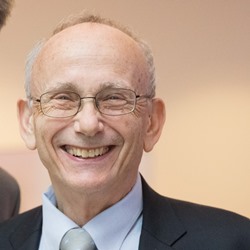
About
Professor Wexler's lab is no longer active and he is not accepting students.
Dr. Wexler received his doctorate in Psychology from Stanford University. He is a professor of Psychology and Linguistics in the Department of Brain and Cognitive Science and the Department of Linquistics and Philosophy, at Massachusetts Institute of Technology. He is director of the Wexler ab/Normal Language Lab and the project affiliated with the HGARC is called Aphasic Comprehension of Raising and Passive Constructions.
Research
The Wexler ab/Normal Language Lab seeks to understand the nature of the computational system of human language in its many guises. We study most aspects of linguistic structure, including syntax, semantics, pragmatics and morphology. In pursuing these goals, we take as our primary linguistic data abnormal language, by which we mean nothing more than any system of language that seems to differ from standard adult language for biological reasons, including lack of maturation, difficulties in learning, and genetic variation.
Thus we study immature language in the child (the development of language), language learned at an unusually late age where there might be lack of plasticity (second language acquisition), aphasia (language loss) and unusual language due to genetic factors (Specific Language Impairment, Down & Williams syndrome, autism, etc). In addition, language learning (e.g. parameter-setting) is studied via precise computational models.
The lab integrates insightful ideas from current linguistic theory with intensive and extensive experimental investigations. At the same time, our theoretical and experimental results often feed back into and influence linguistic theory, for there is much evidence about the nature of the computational system of language that is unavailable to traditional linguistic inquiry, but is available under conditions of abnormal language.
Teaching
9.601 Language acquisition I
9.56J Abnormal language
9.57J Language acquisition
Publications
Modyanova, N. and K. Wexler. 2008. Maximal Trouble in Free Relatives. BUCLD 2007: Boston University Conference on Language Development. pp 287-298
Hirsch, C., Orfitelli, R., and K. Wexler. In press. The acquisition of raising reconsidered. In A. Gavarro and M J. Freitas (eds.) Proceedings of the Conference on Generative Approaches to Language Acquisition. Cambridge, UK: Cambridge Scholars Press.
Hirsch, C. and K. Wexler. 2007. The late acquisition of raising: What children seem to think about seem. In S. Dubinsky and B. Davies (eds.) New horizons in the analysis of control and raising. New York, NY: Springer.
Hirsch, C., Orfitelli, R., and K. Wexler. 2007. When seem means think The role of the experiencer-phrase in children’s comprehension of raising. In A. Belikova, L. Meroni, and M. Umeda (eds.) Galana 2 - Proceedings of the Conference on Generative Approaches to Language Acquisition North America 2. Somerville, MA: Cascadilla Press.

